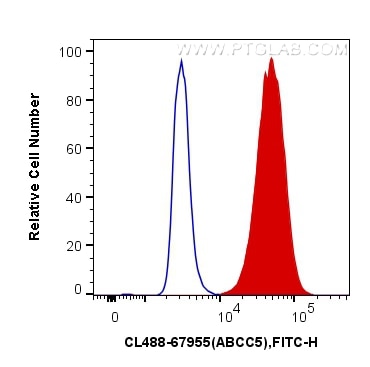CoraLite® Plus 488-conjugated ABCC5 Monoclonal antibody
ABCC5 Monoclonal Antibody for FC (Intra)
Host / Isotype
Mouse / IgG1
Reactivity
Human, Rat
Applications
FC (Intra)
Conjugate
CoraLite® Plus 488 Fluorescent Dye
CloneNo.
2H10F11
Cat no : CL488-67955
Synonyms
Validation Data Gallery
Tested Applications
| Positive FC detected in | MCF-7 cells |
Recommended dilution
| Application | Dilution |
|---|---|
| Flow Cytometry (FC) | FC : 0.40 ug per 10^6 cells in a 100 µl suspension |
| It is recommended that this reagent should be titrated in each testing system to obtain optimal results. | |
| Sample-dependent, Check data in validation data gallery. | |
Product Information
CL488-67955 targets ABCC5 in FC (Intra) applications and shows reactivity with Human, Rat samples.
| Tested Reactivity | Human, Rat |
| Host / Isotype | Mouse / IgG1 |
| Class | Monoclonal |
| Type | Antibody |
| Immunogen | ABCC5 fusion protein Ag31674 |
| Full Name | ATP-binding cassette, sub-family C (CFTR/MRP), member 5 |
| Calculated Molecular Weight | 161 kDa |
| Observed Molecular Weight | 180-190kDa |
| GenBank Accession Number | NM_005688 |
| Gene Symbol | ABCC5 |
| Gene ID (NCBI) | 10057 |
| Conjugate | CoraLite® Plus 488 Fluorescent Dye |
| Excitation/Emission Maxima Wavelengths | 493 nm / 522 nm |
| Form | Liquid |
| Purification Method | Protein G purification |
| Storage Buffer | PBS with 50% Glycerol, 0.05% Proclin300, 0.5% BSA, pH 7.3. |
| Storage Conditions | Store at -20°C. Avoid exposure to light. Stable for one year after shipment. Aliquoting is unnecessary for -20oC storage. 20ul sizes contain 0.1% BSA. |
Background Information
ABCC5, also named as MOAT-C, pABC11, SMRP and MRP5, belongs to the ABC transporter superfamily, ABCC family and Conjugate transporter (TC 3.A.1.208) subfamily. ABCC5 acts as a multispecific organic anion pump which can transport nucleotide analogs. ABCC5 functions in the cellular export of its substrate, cyclic nucleotides. This export contributes to the degradation of phosphodiesterases and possibly an elimination pathway for cyclic nucleotides. Studies show that ABCC5 provides resistance to thiopurine anticancer drugs, 6-mercatopurine and thioguanine, and the anti-HIV drug 9-(2-phosphonylmethoxyethyl) adenine. ABCC5 may be involved in resistance to thiopurines in acute lymphoblastic leukemia and antiretroviral nucleoside analogs in HIV-infected patients. Alternative splicing of this gene has been detected; however, the complete sequence and translation initiation site is unclear.
Protocols
| Product Specific Protocols | |
|---|---|
| FC protocol for CL Plus 488 ABCC5 antibody CL488-67955 | Download protocol |
| Standard Protocols | |
|---|---|
| Click here to view our Standard Protocols |


